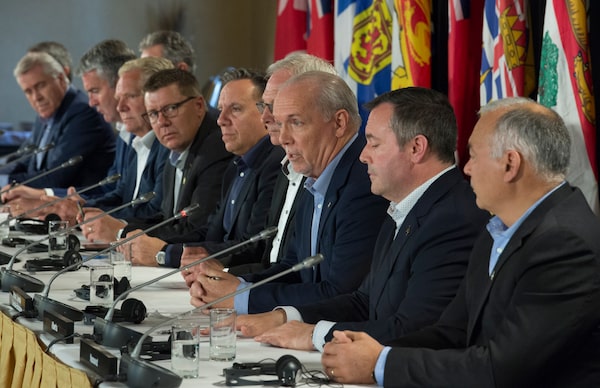
Canada's Premiers are seen during a closing news conference following a meeting in Saskatoon, Sask., on July 11, 2019.JONATHAN HAYWARD/The Canadian Press
While Justin Trudeau’s government prepares to ramp up efforts to fight climate change and to craft a national pharmacare program, the unofficial opposition meets Monday in Mississauga, hoping to forge a united response.
The Council of the Federation, as the premiers are known when they meet without the prime minister, is the most formidable counterweight to the Liberals, especially with the Conservatives in turmoil. How united they remain will determine how much Mr. Trudeau is able to interfere in their affairs.
Ontario Premier Doug Ford suggested the meeting, in an effort to reduce tensions within the federation. But the tensions are not primarily among the premiers. They are between the premiers and Mr. Trudeau.
Alberta Premier Jason Kenney, with the support of Saskatchewan’s Scott Moe, this year’s council chair, will be searching for consensus on an energy and environmental policy that encourages development of the oil sands and removes the federal carbon tax. He may get it. Even provinces that oppose increasing oil and gas exports resist federal efforts to dictate control over natural resources, a provincial jurisdiction.
Mr. Trudeau has promised to listen to and respect the concerns of the premiers. But during the election campaign, he also promised to meet a new, stringent, goal of net-zero carbon emissions by 2050, with an expert panel directing the government on how to meet each five-year target. That can only mean a higher carbon tax, which provinces resist.
Even the strongest supporters of a carbon tax must accept that, if provincial governments oppose the tax and fight relentlessly against it, meeting the target will be harder, not easier. Realistic measures that all sides can support will in the long run accomplish more than a draconian program that fails through provincial opposition.
There will also be demands for increased federal spending on health care and infrastructure, and changes to the fiscal stabilization program, which aids provinces that undergo a sudden economic downturn. This is not simply provincial whining. Ottawa, through its taxing power, has the resources that provinces need to fund schools and hospitals and roads.
Although it’s not on Monday’s agenda, the biggest challenge facing the premiers is the Liberal proposal to create a national pharmacare program. You may ask why the premiers would resist a plan to lower the cost of prescription drugs while extending coverage to millions of Canadians who don’t have it.
The answer lies in examining the legacy of Pierre Trudeau. On his watch, Ottawa convinced or coerced provincial governments to join in cost-sharing social programs in health care, social housing, welfare and more.
But over the years, the federal government cut back its share of the funding, leaving the provinces in the lurch. The result: provincial governments that have a smaller share of the tax pie, but most of the burden for funding health, education and other social programs.
If pharmacare is to go ahead, the program should be 100-per-cent federally funded. If the funding is shared-cost, any province must be able to opt out at any time, with compensation.
The provinces aren’t blameless. There hasn’t been nearly enough progress on reducing internal trade barriers. Ottawa should be encouraging the premiers to do more.
That is what the federal government should always be doing, in areas of provincial or shared jurisdiction: encouraging, cajoling, supporting, sharing, co-ordinating, convening.
When Ottawa uses its spending power to bend the provinces to its will, the result is invariably something like the October election returns: a weakened governing party, the Bloc Québécois back in force in the House of Commons, and rising separatist sentiment on the Prairies.
The national mission to reduce carbon emissions must be co-operative and voluntary. The national pharmacare program must be either fully federally funded, or under provincial control. In government, as in human relations, coercion breeds resistance and, if carried too far, rebellion.
In an effort to ease the regional tensions that he created, Mr. Trudeau has appointed Chrystia Freeland, one of his ablest ministers, Deputy Prime Minister and Minister of Intergovernmental Affairs.
Will she succeed? That depends on whether she respects the will of the premiers. And then convinces her boss.
Our Morning Update and Evening Update newsletters are written by Globe editors, giving you a concise summary of the day’s most important headlines. Sign up today.
 John Ibbitson
John Ibbitson